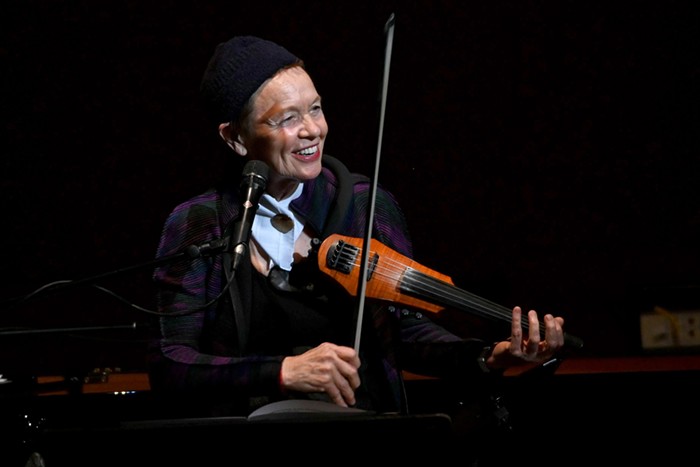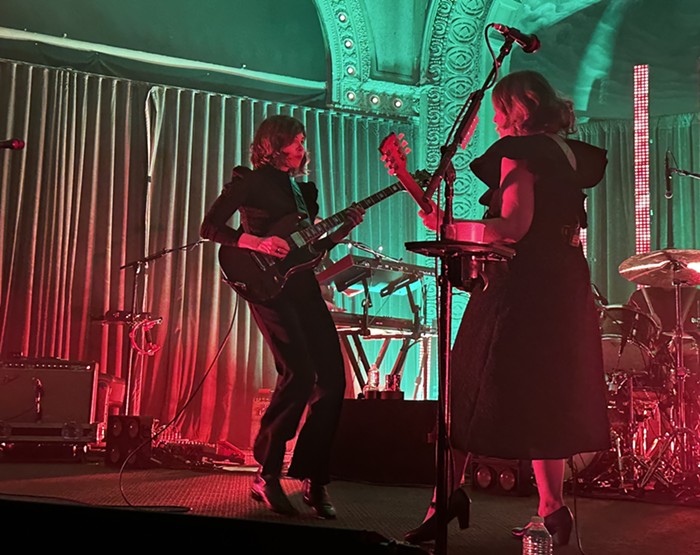PRINCE
3121
(Universal)




Prince's 2004 commercial-comeback album, Musicology, though tremendous in terms of rejuvenating his public standing, threatened a flattened and sterilized future for the artist. It was both lyrically and musically drained of sex and felt a bit fogeyish in its retro-funk fetishizing. 3121 is all the more gladdening, then, as it finds Prince indulging in more extreme and more successful experimentation than he has for over a decade.
The lusciously weird opener "3121" (seemingly excavated from the vault) sets the tone well with its ominous call to an endless party at Prince's new spot. First singles "Te Amo Corazón" and "Black Sweat" score immensely as well, with, respectively, giddily weird orchestration and an aggressively bare synth bludgeon. Some songs find Prince committing more fully to modern sounds and modern pop/R&B production than he ever has before, but elevating them beyond what they could ever be in the hands of today's starlets. Others, like the "Adore"-styled ballad "Satisfied," are pure soul music but, unlike the hypothetically "real music" on Musicology, don't feel anesthetized for adult-contemporary consumption. For the first time in years, Prince is making music that one can actually imagine young people getting excited by. While not a consistently great album, 3121 contains truly the greatest songs that Prince has produced since 1991's Diamonds and Pearls, and it could suggest great things for his future. 3121 feels more like a true return to form than its predecessor by being more virile, more visceral, and more unafraid in its execution. SAM MICKENS
THE DIRTY PROJECTORS
New Attitude
(Marriage Records)




Everything sounds a little backward, like the guitar and drums and vocals are rushing at you from a flipped tape, surging illogical and irrational, backed by an orchestra of reptilian birds with cellos made from elephant bones. And it seems weird—oddly timed, mantric, undiscovered country with guitars plucked with icicles and steel cables for strings, vocals that get all barber shop quartet before kicking into Indian chants and animal squawks. But the great thing here is it's smart. The band knows fully well what they're doing, and they're doing it for a purpose: purpose being, the total re-imagining of rock as some kind of future fantasy R&B.
Did you see these guys play Towne Lounge on Sunday night? Did you stand right next to them when they picked up acoustic guitars and played un-amplified in the middle of the room? Did you fall in love and then fall in love with love? Yes? Good. No? Get this record. If you buy it and don't like it, let me know and I'll send you an I'm-sorry-gift. But I'm thinking a lot of people are going to be into this. ADAM GNADE
WOODEN WAND & THE VANISHING VOICE
Gipsy Freedom
(5 Rue Christine)




Wooden Wand & the Vanishing Voice make tribal-free folk. The sinister tone underscoring everything they do is meant for dark hours and dim lighting, if any lighting at all. Gipsy Freedom ups their usual jazz quotient by dragging to center stage legendary NYC saxophonist Daniel Carter for two tracks. Opening the disc with a loose little sax meditation ("Friend, That Just Isn't So"), Carter sets a contemplative tone that is sustained throughout the album. Each successive track is anchored by a somber wooden beat, usually no faster than a dripping faucet, as the musicians slowly branch out, growing into the ample open space, decorating it with dark, spidery sounds of slinky bass, jangling tambourines, echoing woodblock, and rippling feedback. "Don't Love the Liar" features explosive harmonies that sound like Jefferson Airplane on peyote, and "Sun Sets on Clarion" has Wand Jehovah's vocals fuzzed as though they're being fed through a dust-clogged bullhorn.
But the finest songs on Gipsy Freedom are those sans vocals, with each beat building higher and throbbing with subtle intensity. Every sound carries a psychedelic-trance vibe and is engineered for zoning out, making WW&VV easy company with No-Neck Blues Band and Jewelled Antler Collective. BRIAN J. BARR
MADLIB THE BEAT KONDUCTA
Vol. 1–2: Movie Scenes
(Stones Throw)




Issued under the guise Beat Konducta (one of many pseudonyms used by California hiphop producer Madlib), Movie Scenes Vol. 1–2 first appeared last year on two volumes as a vinyl-only release. Ironically, it's being issued as a CD just a few months after the late Jay Dee's instrumental album Donuts hit stores. Movie Scenes is an accurate description: There are 35 instrumental songs that run between one and three minutes (most of Madlib's songs, whether cinematic or not, are pretty short), are randomly sequenced, and aren't intended for any movie hitting a theater near you, but they could be a soundtrack for a film in your mind.
Sonically, Movie Scenes finds Madlib experimenting with new production styles, from chopping up different segments of the same record, and then imaginatively rearranging the parts ("The Rock," "Outerlimit"); to creating long, looped tapestries of flavorful samples (the psychedelic "Left on Silverlake," which is reminiscent of frequent Alfred Hitchcock soundtracker Bernard Herrmann). Jay Dee's influence is keenly felt on a few of the tracks, particularly the dark and sinuous "Offbeat."
Overall, Movie Scenes is uniformly excellent, even if Madlib leaves few clues to allow listeners to apprehend a strong impression of what it's all supposed to mean. All that ties them together are multiple vocal snippets such as one of Method Man snarling, "I wasn't really feeling my shit, but all of a sudden I was feeling my shit." MOSI REEVES



 Pastafarian Rhapsody
Pastafarian Rhapsody


 Perry Bible Fellowship
Perry Bible Fellowship

 Maakies
Maakies
 Blecky Yuckerella
Blecky Yuckerella


















